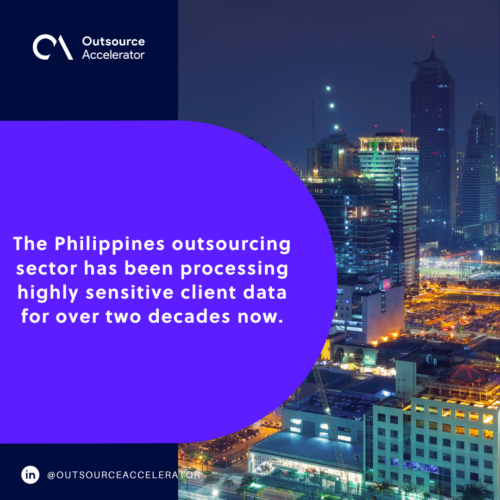12 reasons why you should outsource to the Philippines

12 reasons why the Philippines the best outsourcing destination
Reasons why the Philippines is the best outsourcing destination
- Cost efficiency
- Cultural compatibility
- English Proficiency
- Highly skilled workforce
- Flexible workforce
- Reduced legal liabilities and management issues
- Data security and privacy
- 24/7 staffing – timezone neutral
- Economic growth
- Track record of the BPO industry
- Government support
- Fringe benefits
This article is a submission by Djulia Montana de Veyra, a freelance writer with almost two decades of experience under her belt. One of her articles made it to The Source competition’s top 10, besting hundreds of entries. Learn more about Djulia here.
The first business process outsourcing (BPO) contact center in the Philippines was built in 1992.
Noticing a promising opportunity, the Philippine government established a special economic zone to support outsourcing and encourage more foreign companies to set up customer support centers in the country. Since then, more outsourcing companies have opened business operations in the Philippines. Today, the BPO industry collectively employs over 1.4 million people.
Outsourcing to the Philippines is the new normal
The Philippines has grown to be one of the top outsourcing locations in the world. Even with the rise of new markets, the country remains a go-to destination for short-term and long-term projects.
The industry’s growth is prevalent in the country, with around 1.4 million workers and US$29.1 billion in revenue as of 2022, according to IBPAP.
Aside from contact center services, the Philippines is a notable market for creative and professional services such as accounting, animation, and digital marketing.
With the growing number of small businesses realizing the benefits of outsourcing their operations, the Philippines expects to cater to more clients and provide better services in the long run.
The Philippines continues to be a leading global hub in the outsourcing industry due to its robust infrastructure and government backing that encourages foreign investment.
Common outsourcing services offered in the Philippines
The Philippines has emerged as a leading destination for Business Process Outsourcing (BPO), offering a diverse range of services that cater to various global business needs. Here are the top five outsourcing services provided by BPO companies in the Philippines:
- Customer support. BPO companies provide 24/7 customer service through call centers, chat support, and email management, ensuring high levels of customer satisfaction.
- Technical support. These services help businesses resolve technical issues for their products or services, often including troubleshooting and IT support through various communication channels.
- Finance and accounting. BPO firms offer services like bookkeeping, payroll processing, and financial analysis, allowing companies to streamline their financial operations and reduce costs.
- Human resources outsourcing (HRO). This includes recruitment, onboarding, and employee management, enabling businesses to focus on core activities while efficiently managing their workforce.
- Content moderation and management. BPO providers assist in moderating online content, ensuring compliance with community guidelines and managing user-generated content across platforms, enhancing brand reputation.
These services highlight the Philippines’ capabilities in delivering quality outsourcing solutions, making it a favored choice for global businesses.

Challenges when outsourcing to the Philippines
While there are many advantages when outsourcing to the Philippines, there are also significant challenges that companies may face.
Here are five key challenges of outsourcing to the Philippines:
1. Cultural differences
The Philippines has a unique culture that may differ significantly from that of the outsourcing company.
Misunderstandings can arise from varying communication styles, work ethics, and business practices, potentially leading to friction and inefficiencies.
2. Infrastructure issues
While urban areas in the Philippines may have decent infrastructure, rural regions often face challenges such as unreliable internet connectivity and frequent power outages.
These issues can disrupt operations and affect productivity.
3. Talent retention
The competitive job market in the Philippines means that skilled workers often receive multiple job offers. This can lead to high turnover rates, making it difficult for companies to maintain a stable workforce and ensuring continuity in service delivery.
4. Regulatory environment
Navigating the local legal and regulatory landscape can be complex.
Businesses must comply with various laws, including labor regulations and tax requirements, which may differ from those in their home countries, potentially leading to compliance risks.
5. Communication barriers
Although many Filipinos are proficient in English, variations in dialects and accents can sometimes lead to communication challenges.
Additionally, different time zones can hinder real-time collaboration, affecting project timelines and responsiveness.
12 reasons to outsource to the Philippines
The success of the outsourcing industry in the Philippines can be attributed to the many advantages the country offers investors.
Foreign companies consider the Philippines to be among the top outsourcing destinations due to its well-established outsourcing industry.
Learn more about the factors why you should outsource to the Philippines.
1. Cost efficiency
By outsourcing to the Philippines, businesses can save 60% to 80% of operational costs. This is because of the low cost of living in the country.
The salary of fresh graduates in the Philippines is a small fraction of their counterparts in the West. The daily wage of Filipino professionals can amount to only the hourly salary of an employee in Europe or the US.
Outsourcing to the Philippines is a strategic choice for businesses looking to benefit from a top outsourcing destination with cost efficiency.
2. Cultural compatibility
Formerly colonized by the Spanish, Americans, and Japanese, the Philippines continues to show remnants of its past through its traits and values.
Many companies opt to farm out services to the Philippines due to its thriving outsourcing industry and remarkable cultural compatibility.
Western culture is still entrenched in people’s everyday lives, and Filipinos remain highly adaptable to foreign cultures.
Moreover, hospitality is an integral part of Filipino culture and tradition. These factors make Filipinos easy to socialize and work with.
3. English proficiency
Around seventy percent of Filipinos are fluent in English. Most local children learn the language even before they start going to school.
Their English proficiency is further reinforced once they start getting a formal education. English is the medium of instruction used in schools in the Philippines and is the primary language for local commerce.
EF ranked the Philippines 22nd for English proficiency worldwide and second in Asia, next to Singapore.

4. Highly skilled workforce
The Philippines has a large young population that is growing faster than the country’s dependent children and retired workforce.
Beyond just resulting in an abundant supply of manpower, the statistics also amount to a highly educated workforce boasting a literacy rate of 97%, according to the most recent census.
Every year, local universities and colleges produce an additional 500,000+ to the pool of skilled and qualified workers. As per experts, the Philippines will continue to benefit from this young and talented workforce in the coming years.
5. Flexible workforce
Companies choose to outsource to the Philippines due to its flexible workforce and reputation as a top outsourcing destination.
Building an offshore team in the Philippines allows you to scale quickly and efficiently without any capital investment or infrastructure requirements.
You can expand a team quickly and cost-efficiently. Equally, you can shrink your team again if you have seasonal work or your business takes a turn for the worse.
Generally, you can arrange agreements with outsourcing suppliers for low commitments and very flexible terms.
6. Reduced legal liabilities and management issues
Employing staff in any country comes with a lot of regulation, compliance, administration, tax, and cost implications.
Some countries and sectors are more burdensome than others. Hiring offshore staff in the Philippines means that you can protect yourself from the exposure and recourse of employing people in-house or directly.
This simplifies your administrative processes and limits any cost and liability exposure – which is fantastic.
The Philippines actually has a very established labor law, and they are generally pro-labor. It can be a complex system if you have to have direct involvement with it.
However, when you work with an outsourcing supplier, they will manage all of the day-to-day and compliance aspects of your team’s HR.
7. Data security and privacy
With the industry existing for over 30 years, the Philippines has built an incredibly sophisticated call center industry and a strong regulatory environment in support of the sector.
The Philippine’s outsourcing sector has been processing highly sensitive client data for over two decades now. BPO companies in the country embody a dedication to upholding stringent data protection protocols, ensuring confidential information remains secure.
BPOs have processed everything from US health insurance, medical records, and personal financial data for some of the world’s biggest public and private companies.
The Philippines can provide any compliant environment and work system, and it has adopted one of the most stringent data privacy acts.

8. 24/7 staffing – timezone neutral
The Philippine workforce is highly geared towards 24/7 coverage. So, regardless of your company’s or your clients’ time zones, the Philippines can offer business solutions anytime and anywhere.
The single biggest client country in the Philippines is the USA, and there is a 12-hour time difference between the two countries.
So, about 60% of the outsourcing workforce in the Philippines still works the night shift to cover the US hours. This is very normalized in the Philippines.
Equally, rotating shifts and weekend cover are also very standard and accepted conditions within the outsourcing industry.
These traits are particularly applicable to customer service and online sales functions, where 24/7 support coverage is a common requirement.
9. Economic growth
According to the IT and Business Process Association of the Philippines (IBPAP), the BPO industry of the Philippines saw revenue increase 10.3% to $32.5 billion, and staff count rise 8.4% to 1.57 million.
Filipinos are now enjoying stronger purchasing power because of the country’s robust economy. Foreign investors stand to benefit from a business environment that is conducive to growth and scalability.
10. Track record of the BPO industry
The business process outsourcing industry in the Philippines began in 1992 and has been in existence for over 25 years. Its total revenue has since increased tenfold.
The country’s BPO sector has a global market share of 10%, which is a three-fold increase since 2004. This global market share is estimated to be at 15% by 2022.
Sykes Asia, Convergys, People Support, and Accenture were the first multinational companies to establish operations in the Philippines.
These businesses have since extended their operations to include cities outside Metro Manila, such as Davao, Bacolod, Cebu, and more.
This is a reflection of the country’s track record of providing attractive business process deals. Partnering with Filipino professionals in the BPO industry can give companies a competitive edge and streamline processes, ensuring success and growth in the global market.
11. Government support
Outsourcing to the Philippines offers numerous advantages, and one key factor is the strong government support available for businesses.
The Philippine government provides the industry with strong support by way of regulations and incentives that encourage companies to choose the Philippines for their offshore operations.
This led to the establishment of the Philippine Economic Zone Authority (PEZA). Aside from support, PEZA also provides fiscal and non-fiscal benefits, such as four-year and eight-year income tax holidays.
The government further stressed its commitment to supporting the BPO industry through the Philippine IT-BPM Roadmap 2028, with a goal of reaching a 2.5 million workforces and $59 billion in revenues by 2028.
12. Fringe benefits
Outsourcing allows you to adopt a “follow the sun” workflow strategy, which means you have staff working around the clock.
While your onshore employees are sleeping, your offshore operation, operating halfway across the world, has people getting things done.
This speeds up your delivery cycle for faster production and reduces process development duration. Offshore outsourcing proves to be a smart strategic move for companies of all sizes.
Choosing the Philippines as your outsourcing destination lets you maximize the benefits. Whether you need to outsource creative services, website development, IT support, or contact center solutions, you stand to benefit from the talented workforce and government-sponsored advantages in the Philippines. Go ahead and explore your options!

How to outsource to the Philippines
Outsourcing to the Philippines can be a great way to save costs and leverage the skills of a talented workforce.
Here are some steps businesses can follow to outsource to the Philippines:
Determine the scope of work
First, businesses should determine what functions they want to outsource.
The BPO industry in the Philippines has significantly grown over the years, offering a wide range of services from customer service and IT support to digital marketing and finance.
Look for outsourcing partners in the Philippines
The country is home to a number of leading BPO companies across the globe. Firms can look for outsourcing partners through online job portals, professional networks, and outsourcing service providers.
Evaluate potential outsourcing partners
Businesses should evaluate potential outsourcing partners to ensure they have the necessary skills, experience, and infrastructure to perform the required tasks.
Consider language proficiency, technical expertise, infrastructure, and customer support level.
Develop a contract
Once a business has chosen an outsourcing partner, they should develop a contract that details the scope of work, deliverables, payment terms, and other relevant information.
The contract should also include provisions for data confidentiality and security.
Set up communication channels
Effective communication is critical when outsourcing to the Philippines.
Organizations should establish communication channels that work for both parties, including email, chat, video conferencing, and project management tools.
Manage the outsourcing relationship
To ensure a successful outsourcing relationship, businesses should actively manage it, monitor progress, and provide feedback to the outsourcing partner regularly.
When selecting outsourcing services, choose reputable providers that align with your business values and objectives.
Following these steps can help businesses successfully outsource to the Philippines and realize the full benefits of outsourcing.
Philippines: The ideal outsourcing destination
The Philippines stands as a top outsourcing destination, known for its exceptional workforce and cost-effective solutions.
Choosing the Philippines for outsourcing services is a strategic decision that can help businesses scale and optimize their operations effectively.
Talk to the outsourcing experts about getting started with outsourcing – get a free quote and consultation today.
Experience first-hand what milestones you can achieve with an outsourcing partner ready to provide you with the world-class business solutions you need.
Want to learn more about outsourcing? Check out the Inside Outsourcing book as well as the Inside Outsourcing book review today!







 Independent
Independent




